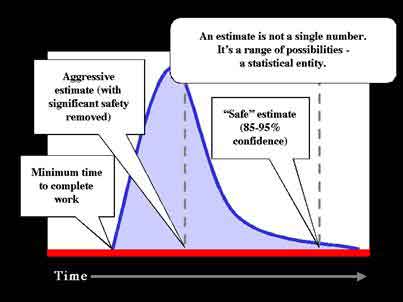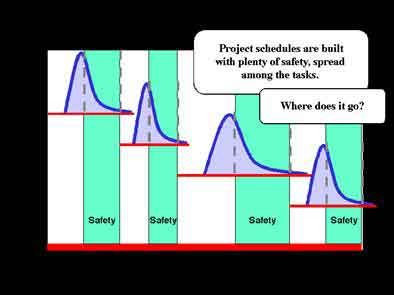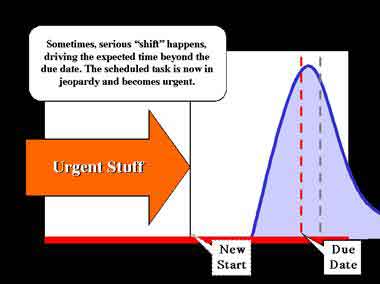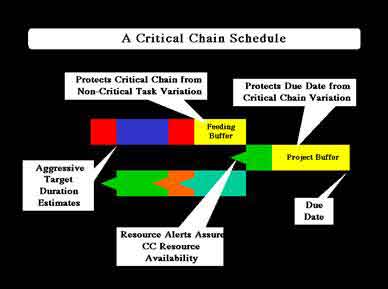
Francis S.P.
Источник: http://www.focusedperformance.com/articles/ccpm.html
Uncertainty is why we need project management. How we manage for uncertainty is at the core of improvement of project performance-getting projects done both faster and with better reliability of the promised deliverable dates.
Developed through the application of the Theory of Constraints to the subject of projects, "Critical Chain Scheduling" suggests the shifting of focus from assuring the achievement of task estimates and intermediate milestones to assuring the only date that matters — the final promised due date of a project. But how to do that is the question that requires us to look at some current common project practices and how they lead to "Parkinson's Law".

When looked at as a whole, these estimates are not really a single number, but rather they are statistical entities, reflecting the probability of task completion in a certain amount of time. An aggressive estimate, reflecting only the amount of work required might have a 50% level of confidence, while a longer realistic estimate, one against which the resource is comfortable committing to, might be closer to an 85-95% range of confidence.
So task estimates have plenty of safety in them, above and beyond the actual expected time to do the work. Often this safety is the larger part of the estimate, doubling or tripling the amount of time the work would require if done in a vacuum.

In most projects, estimates are turned into a project schedule-a list of dependent tasks with associated start-dates and due-dates. People plan their work around these dates and focus on delivering their deliverables by these dates. They also try to plan other work so they are free to work on the project task at the start date.

The safety that we included was not only for the non-project distractions, but also for the unknowns (the "Murphy") associated with the task itself. We can't know what problems will crop up until we start the work. And we've started the work later than planned, after eating up most, if not all, of our safety attending to other important work. There isn't time left to recover from the problems in time to meet the due date, at least without heroics, burnout, or loss of quality.

The Critical Chain Schedule avoids expansion from Parkinson's Law by eliminating due dates and allowing us to take advantage of early task finishes. This schedule is also protected against untimely availability of critical resources by the alerts of work coming from preceding tasks. The project promise is protected from variation (Murphy) in the critical chain by the project buffer and the critical chain is protected from variation in non-critical work by the feeding buffers.
How can we manage the execution of a project-how do we know what shape our project is in once it gets started, if we don't have due dates to track.

This process allows us to stay out of the way of the project resources if things are on track, build a contingency plan in something other than a crisis atmosphere, and implement that plan only if necessary.
Источник: http://www.focusedperformance.com/articles/ccpm.html